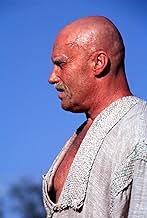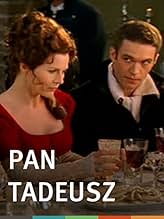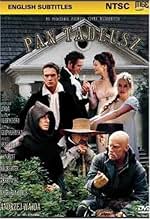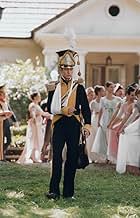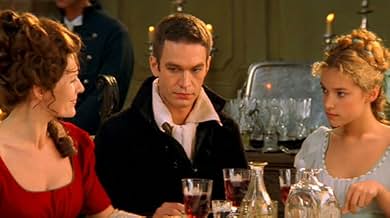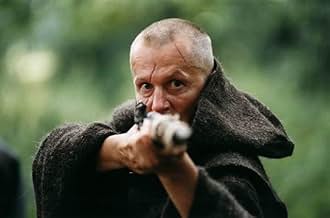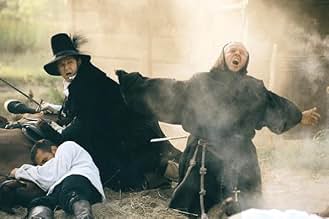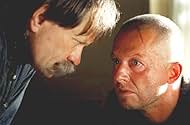Aggiungi una trama nella tua linguaIn the early 1810s, Poles, part of Russia's client state of Lithuania, think independence will come if they join forces with Napoleon when he invades Russia. This unity of purpose, in one di... Leggi tuttoIn the early 1810s, Poles, part of Russia's client state of Lithuania, think independence will come if they join forces with Napoleon when he invades Russia. This unity of purpose, in one district, is undermined by two families, feuding since the head of one shot the head of the ... Leggi tuttoIn the early 1810s, Poles, part of Russia's client state of Lithuania, think independence will come if they join forces with Napoleon when he invades Russia. This unity of purpose, in one district, is undermined by two families, feuding since the head of one shot the head of the other twenty years before. There are hopes of a reconciliation through a marriage of Pan T... Leggi tutto
- Regia
- Sceneggiatura
- Star
- Premi
- 7 vittorie e 5 candidature totali
- Zosia Horeszkówna
- (as Alicja Bachleda-Curus)
- Rykow
- (as Siergiej Szakurow)
Recensioni in evidenza
But why the costume drama? I really wish he'd left this one alone.
It's not unlike 1999's other bloated Polish historical epic, "Ogniem i mieczem" ("With Fire and Sword"). Here again Poles put aside their differences to prove they're the greatest people, or at least the greatest Slavs, on Bóg's green earth. Rah, rah. A crowd of Polish lesser gentry (rabble) armed with swords can defeat trained Russian musketry any day.
And, yes, I am of Polish descent myself, although I'm embarrassed to admit it in this jingoistic context. That's why I was at the special screening in the first place, sponsored by Toronto's Polish newspaper.
"Pan Tadeusz" shares another characteristic with its elephantine contemporary: its ability to confuse non-Polish-speaking members of the audience with its vast number of characters and their poorly defined interrelationships.
Both films too have a sudsy quality. So did "Gone With The Wind", but then character definition makes that historical epic a success. Tadeusz and Zosia are indistinct phantoms as personalities. Certainly no Rhett or Scarlett.
"With Fire and Sword" is more melodramatic than "Pan Tadeusz", but it's also more exciting. This film has a laudable grandeur which Wajda brings to the proceedings, but still I wish he'd picked a subject with a bit more substance.
Wojciech Kilar can be congratulated on his score. And Daniel Olbrychski is always good to see, even with scars all over his head.
It should be noted that Polish-speaking spectators at the theatre appeared to find this film quite enjoyable. They would be chuckling at clever turns of phrase in the dialogue, while the English titles would be saying something indescribably prosaic. Evidently the film loses nearly everything in translation.
The actors are mainly well-known faces in Polish cinema and yet all rise above the stereotypical images many of the audience have of them. The greatest example of this is Boguslaw Linda as Robak the Priest. In the most moving scene in the film he gives the performance of his life.
The harmonious blend of Wajda's direction and Wojciech Kilar's score is a sensual feast. It is a film which impresses a profound sense of beauty to such an extent that one could appreciate the sheer art of the film without even having to understand the language (I cannot vouch for the quality of the sub-titles in English as I saw it in its original version).
If you only see one foreign language film this year, make sure it is this one.
The dialogue is drawn directly from the poem so it is in rhyming couplets. The acting styles and set design marvelously match the romantic, expressive language. The poem was published in 1834 and Adam Miczkiewicz was, I understand, influenced by Walter Scott. The English subtitles fail the film badly. They should have taken the risk of using a translation in a similar style. Unfortunately, for a non-Polish speaking person, I expect it is like watching Shakespeare translated into the language of the evening news. It looks terrific but a lot of the richness is missed.
Excellent movie! Wajda has done an excellent job. Wajda is indeed the world's greatest movie director. Congratulations to Wajda on the Oscar you deserve it more than anyone else.
Lo sapevi?
- QuizA polonaise composed by Kilar for this soundtrack gained a nation-wide recognition and became the opening tune for most high school proms. Before the movie the first dance was traditionally accompanied by Chopin.
- ConnessioniReferenced in Poranek kojota (2001)
I più visti
- How long is Pan Tadeusz: The Last Foray in Lithuania?Powered by Alexa
Dettagli
- Data di uscita
- Paesi di origine
- Lingua
- Celebre anche come
- Pan Tadeusz: The Last Foray in Lithuania
- Luoghi delle riprese
- Oporów, Lódzkie, Polonia(castle)
- Aziende produttrici
- Vedi altri crediti dell’azienda su IMDbPro
Botteghino
- Budget
- 12.500.000 PLN (previsto)
- Tempo di esecuzione
- 2h 27min(147 min)
- Colore
- Mix di suoni
- Proporzioni
- 2.35 : 1

